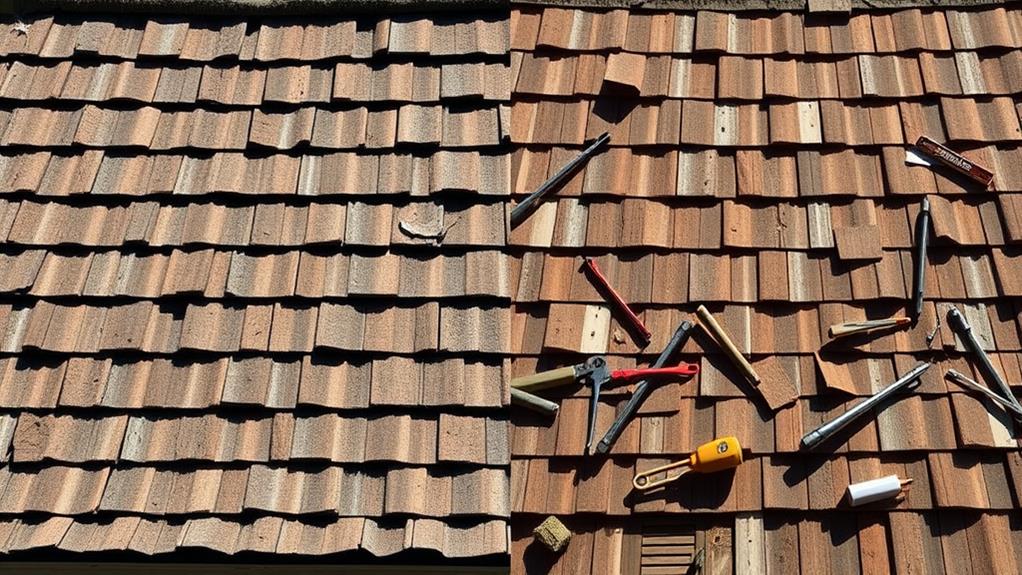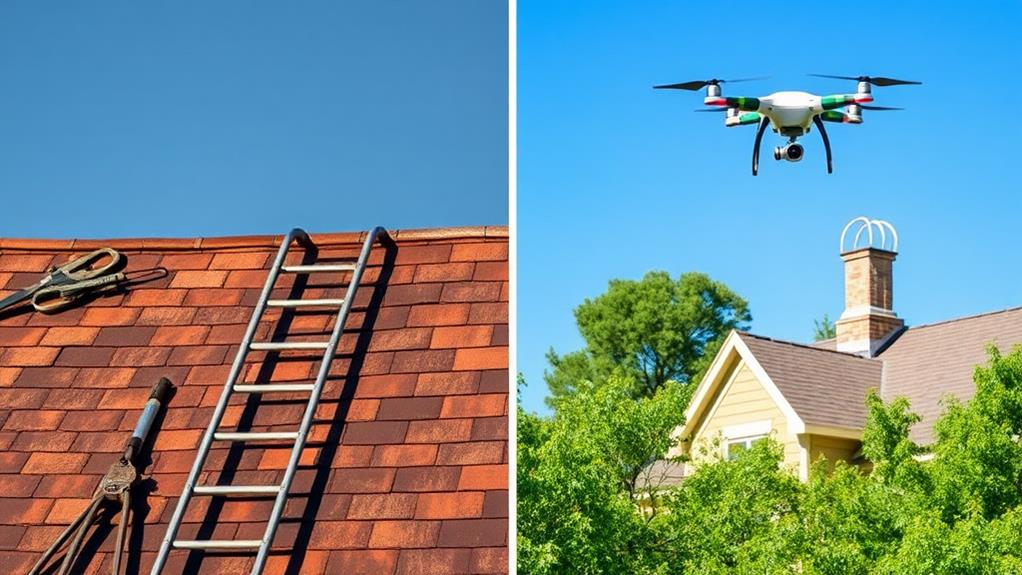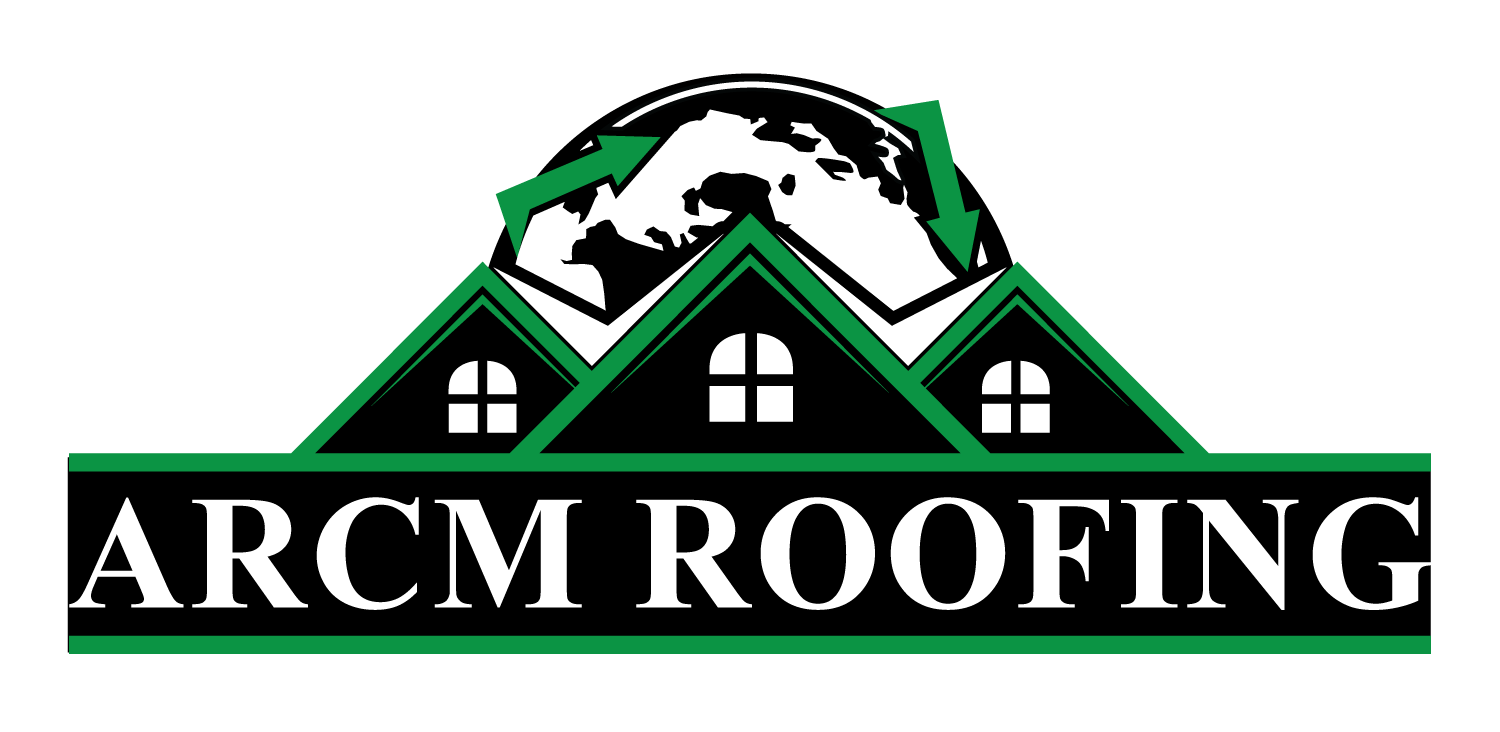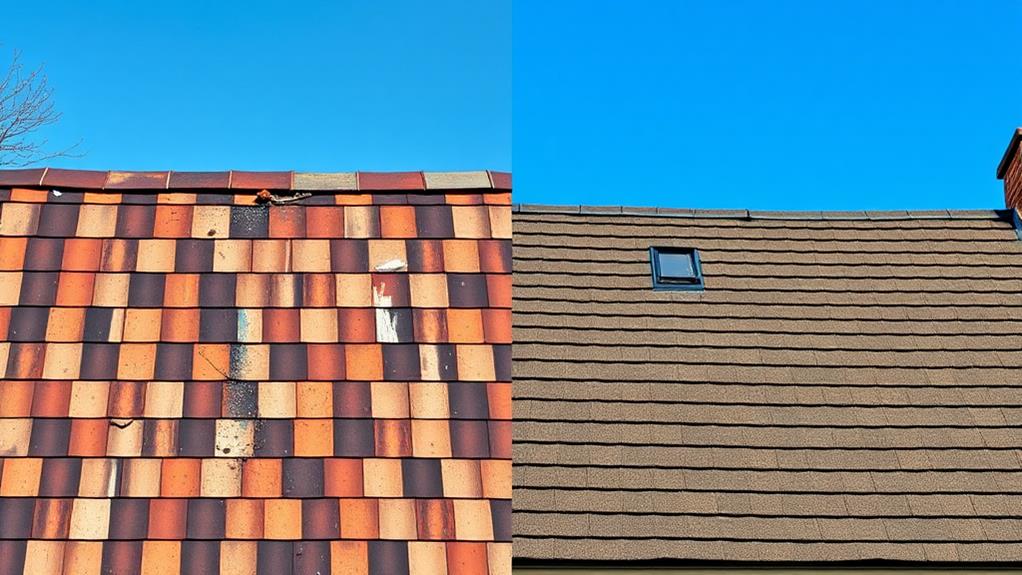Choosing between DIY roof repairs and professional services requires thoughtful evaluation of various elements such as cost-effectiveness, required skill levels, time commitments, and long-term implications. DIY repairs can appear cost-saving initially but involve hidden costs like tool purchases, potential errors, and lack of warranties, potentially leading to increased expenses. Professionals, despite their higher upfront fees, offer expert evaluations, efficiency, and warranties ensuring superior workmanship and compliance with building codes. Their extensive training and experience mitigate long-term risks and provide enhanced structural integrity. A deeper exploration reveals the nuanced benefits of professional roof service offerings and their practical advantages.
Roofing Highlights
- DIY repairs may save upfront costs but risk costly future errors due to lack of expertise.
- Professional roofers offer warranties and ensure quality through adherence to codes and expert assessments.
- DIY requires significant time, skill, and safety preparations, possibly delaying other responsibilities.
- Hidden costs of DIY include tool purchases, error corrections, and potential insurance impact.
- Hiring professionals ensures quick, durable repairs and potential long-term cost savings with warranties.
DIY vs. Hiring Experts

When considering the choice between DIY roof repair and hiring professional experts, it is vital to weigh critical factors such as cost, skill level, and time commitment.
Cost comparison analysis often involves evaluating immediate material expenditures against the potential longer-term savings of professional intervention, especially those offered by certified companies like ISO 9001:2015 certified roofers.
Skill level requirements highlight the technical expertise needed to guarantee both effectiveness and safety. Additionally, time investment considerations address whether the personal time spent on DIY repairs might be more profitably deployed elsewhere, contrasted with the expedience and efficiency typically offered by seasoned professionals.
Cost Comparison Analysis
Determining whether to undertake a roof repair project yourself or to hire a professional largely hinges on a detailed cost comparison analysis. DIY repairs often appeal to homeowners seeking to minimize expenses, as the immediate outlay is typically limited to materials and basic tools. However, one must account for hidden costs such as the time investment, potential for errors leading to further repairs, and increased insurance premiums due to improper installations.
On the other hand, professional roof repairs come with higher upfront costs, encompassing labor, materials sourced at possibly lower rates due to bulk purchase, and the expertise that minimizes the likelihood of oversight. The price of hiring specialists frequently includes warranties, providing peace of mind and long-term financial protection. This safety net reflects the value of expert assessments and risk management, factors that are often underestimated by individuals commencing DIY ventures.
For those within a community that values cohesion and shared decision-making, discussing budgets and priorities with a trusted circle might reveal the pragmatic aspects of expert engagements. Informed by collective wisdom and an understanding of resource allocation, this approach not only underscores fiscal responsibility but also enhances a sense of security and collective well-being.
Skill Level Requirements
Successfully executing a roof repair, whether through DIY efforts or professional hiring, demands a clear understanding of the required skill level. DIY enthusiasts, driven by a desire to save costs or engage personally with the maintenance of their homes, should possess a solid grasp of basic construction and safety protocols. Comprehensive knowledge of roofing materials, tools, and techniques is essential. Without this, individuals may encounter challenges including improper installation or voided warranties, ultimately leading to additional repairs and costs. In addition, physical dexterity and comfort with operating at heights are prerequisites for ensuring personal safety during such projects.
Conversely, hiring professionals offers an assurance of expertise backed by years of specialized training and field experience. Roofing contractors are adept at rapidly evaluating damage, identifying underlying issues, and employing industry-grade materials and methods to deliver lasting solutions. These experts are not only skilled in precise execution but also operate under a framework of regulatory compliance and insurance protection, reducing the risk of oversight or liability for homeowners. By delegating tasks to knowledgeable professionals, homeowners gain the benefit of knowing that their investment safeguards both the structural integrity of their home and the wellbeing of its occupants.
Time Investment Considerations
Time remains a valuable asset when considering roof repairs, whether approached as a DIY project or by hiring professionals. When opting for a DIY roof repair, individuals often underestimate the extensive commitment involved. Beyond initial assessments and planning, DIY enthusiasts must also allocate significant time towards acquiring necessary materials, mastering appropriate techniques, and ensuring ongoing safety protocols — all of which culminate in a substantial time investment. Individuals undertaking their own repairs must be prepared for a prolonged process, one that may risk further delaying other personal or professional obligations.
Conversely, engaging professional services transforms the time equation. Roofing experts come equipped with the tools, materials, and know-how to execute repairs efficiently, guided by years of specialized training and experience. Hiring a professional team expedites the repair process, allowing homeowners to redirect their focus towards their regular routines with minimal disruption. In addition, professional services often include timelines and clear communication, providing peace of mind regarding project duration. For those valuing their time and seeking swift resolution, professional contractors offer a streamlined alternative that affords more leisure and family moments, fostering a deeper sense of belonging and harmony within the household.
Benefits

When considering roof repairs, evaluating the benefits of DIY versus professional services involves a critical examination of cost-effectiveness, skillset requirements, and quality verification.
In areas like Colorado, where hail and strong wind are common, it's especially important to guarantee your roof is repaired correctly to prevent costly interior damage. A detailed cost-effectiveness analysis might reveal upfront savings with DIY approaches, but it requires a careful consideration of long-term quality and safety.
Additionally, an overview of skill requirements underscores the necessity for specialized knowledge and experience inherent in professional repairs, confirming superior quality and reducing the likelihood of future complications.
Cost-Effectiveness Analysis
Opting for DIY roof repairs can initially appear to be a cost-saving strategy, offering the homeowner an opportunity to bypass labor charges associated with professional services. This approach might be particularly appealing to individuals who relish hands-on tasks and enjoy the satisfaction of undertaking home projects.
However, evaluating the long-term cost-effectiveness of such repairs requires a deeper analysis, beyond the immediate financial relief. Engaging in DIY repairs can present potential hidden costs that should be carefully considered. For instance, the purchase of specialized tools and materials—typically included in a roofing contractor's service fee—can quickly erode initial savings. Additionally, the success of DIY projects depends heavily on the individual's proficiency levels and understanding of roofing systems. Inadequate repairs can lead to structural damage, necessitating more extensive and expensive corrective measures, ultimately negating any savings initially perceived.
Conversely, hiring professional roofers, though bearing upfront costs, might be more prudent. Professionals bring expertise, reliability, and warranties, ensuring repairs are accomplished efficiently and safely, often providing a long-term cost-saving advantage. In addition, professional services can enhance property value and longevity, fostering a sense of security and community belonging for homeowners who value expertly executed workmanship.
Skill Requirements Overview
A clear understanding of the skill requirements needed for successful roof repairs can substantially influence a homeowner's decision to either pursue DIY projects or hire a professional. Roofing is a complex field where technical skills, safety awareness, and experience play pivotal roles. DIY enthusiasts may possess fundamental knowledge about tools and procedures, yet executing intricate repairs mandates specialized skills, often acquired through rigorous training and hands-on experience.
For instance, exact identification of roof damage, proficient handling of heavy materials, and adept use of safety equipment are indispensable competencies. These skills not only preserve the structural integrity of a home but also safeguard the individuals undertaking the repairs.
In contrast, professional roofers offer a wealth of experience backed by industry-recognized certifications, assuring homeowners of quality workmanship and accountability. Additionally, professionals are well-versed in adhering to local building codes and regulations, an aspect often overlooked by those opting for DIY solutions.
For those desiring a sense of community and reliance on trusted services, engaging professionals fosters connections with local tradesmen and contributes to the regional economy. As a result, the skill requirements integral to roof repair shape a significant portion of the decision-making process, with each option presenting distinct benefits tailored to different needs.
Quality Assurance Considerations
Ensuring the quality of roof repairs is a paramount concern for homeowners, as even minor flaws can escalate into significant issues over time. Choosing professional roof repairs provides assurance, owing to the expertise and thorough training these specialists possess.
A professionally repaired roof not only embodies precision but also incorporates adherence to building codes, which is an essential component for maintaining property value and ensuring safety standards. These professionals are equipped with advanced tools and, most importantly, a deep understanding of the intricacies involved in roofing work, which greatly enhances the overall quality and longevity of repairs.
Moreover, accredited roofing companies often offer warranties, which stand as a guarantee to their commitment to superior workmanship and customer satisfaction. This warranty provides homeowners peace of mind, acknowledging that any unforeseen issues post-repair will be handled without additional financial burden.
Engaging professionals for roof repairs fosters a sense of belonging to a community where reliability and excellence are prioritized, aligning with the homeowner's desire to safeguard their most cherished asset – their home. This also assures members of the community that they are investing wisely, availing themselves of services that uphold the integrity and value of their homes.
Cost Comparison Insights

In evaluating the financial implications of DIY versus professional roof repairs, it is essential to compare material expenses, labor costs, and the potential for long-term savings. Material costs can vary considerably, with DIY projects generally involving the purchase of basic supplies, while professionals may access bulk purchasing and more durable options. Additionally, labor costs play a pivotal role, as professional services include skilled labor charges, whereas DIY repairs substitute personal time and effort for immediate expenditure savings.
| Item | DIY Cost Estimate | Professional Cost Estimate |
|---|---|---|
| Material Expenses | Lower | Higher |
| Labor | Personal Time | Skilled Labor Fee |
| Long-term Savings | Variable | Potentially Greater |
| Quality of Materials | Standard | Premium |
Material Expenses Breakdown
Efficiently managing material expenses is essential when deciding between DIY and professional roof repairs. For prospective roof repairers weighing these options, understanding the material cost implications can provide clarity. A meticulously itemized material expense breakdown can reveal the nuances between the apparent upfront savings of DIY and the overall cost benefits of hiring professionals.
DIY enthusiasts typically purchase roof shingles, nails, underlayment, and other miscellaneous tools from retail outlets. While these items might appear cost-effective initially, retail costs can add up significantly, especially when factoring in potential errors and waste.
Conversely, professional contractors often source materials at wholesale rates, resulting in lower material costs due to industry connections and bulk purchasing power. These savings, in turn, may be passed on to homeowners within the quoted project price. Critically, professionals possess the foresight to acquire only what is necessary, reducing surplus and minimizing wastage—a financially and environmentally beneficial approach. Material warranties offered by suppliers to licensed contractors can further enhance value, providing long-term security against defects.
Both DIY enthusiasts and potential clients of roofing companies should evaluate not only the raw expenses but also consider warranty benefits and long-term material performance as integral components of their decision-making processes.
Labor Cost Evaluation
Evaluating labor costs is a critical factor when deciding between DIY and professional roof repairs. For those contemplating the DIY route, the appeal lies in eliminating labor expenses entirely, which can constitute a significant portion of overall repair costs. However, it's vital to bear in mind not only the value of one's time but also the potential learning curve and potential inefficiencies.
Many home repair enthusiasts find that the intricacies of roofing tasks demand considerable hours, possibly extending beyond initial estimates, thereby consuming weekends or vacation days.
In contrast, hiring a professional service may seem pricier upfront due to labor fees, but these fees often reflect the efficiency and expertise brought by skilled workers. Professional roofers, through their acquired knowledge and refined techniques, complete tasks swiftly and with precision, reducing the risk of future complications. This efficiency shortens the repair timeline, offering homeowners the luxury of reclaiming time for personal endeavors and peace of mind.
The decision ultimately pivots on individual circumstances and priorities, including time availability, personal skill levels, and comfort with potentially risky tasks at heights. Evaluating these factors against the backdrop of labor costs can illuminate the path most congruent with one's lifestyle and aspirations.
Long-term Savings Consideration
Deciding between DIY and professional roof repairs not only impacts immediate expenses but also bears long-term financial implications. While tackling roof repairs independently may present an initial cost-saving allure, this approach can manifest hidden expenses over time.
Materials acquired at retail prices and potential tool rentals might offer immediate savings but often fail to match the durability and quality guaranteed through professional expertise. Conversely, engaging a professional verifies that repairs are conducted with precise attention to detail, using materials with higher-grade durability.
Furthermore, professional roof repairs often come with warranties that safeguard against future defects, thereby reducing recurring costs on minor fixes. This warranty can cultivate a sense of communal safety and assurance, embedding trust within professional services and alleviating future financial strain.
DIY repairs, lacking such protective guarantees, heighten the risk of frequent maintenance, inadvertently escalating cumulative expenses. Additionally, improperly executed repairs can lead to hidden damages such as leaks or structural compromises which may necessitate costly interventions later.
Connect With Us
Looking to make a decision between DIY and professional roof repairs? Trust the experts to guide you! Our skilled team is ready to provide top-quality service and guarantee your roof is in its best condition.
Don't risk your safety or the durability of your roof with DIY mistakes. Connect with us today for a consultation and experience the peace of mind that comes with professional care. Call us now at (303) 306-8384 to schedule your appointment and protect your home.
Roofing FAQ
What Are the Risks of Improperly Repairing a Roof Yourself?
Improperly repairing a roof may lead to structural damage, water infiltration, increased repair costs, and potential safety hazards. Such outcomes highlight the importance of ensuring proper techniques and expertise to safeguard property value and occupant safety.
How Often Should a Roof Be Inspected for Damage or Wear?
To guarantee robust roof health, inspections are recommended biannually. Conducting assessments at the end of winter and summer helps identify potential issues early, fostering community confidence by safeguarding homes against environmental elements and preserving structural integrity.
What Materials Are Best for DIY Roof Repairs?
Selecting appropriate materials for roof repairs is vital. Asphalt shingles, roofing cement, and self-adhesive membranes are commonly recommended due to their accessibility and ease of use, fostering a sense of empowerment for the knowledgeable and prepared homeowner.
Are There Permits Required for Roof Repairs?
When contemplating roof repairs, it is essential to ascertain local building codes, as many regions require permits even for minor repairs. Ensuring compliance not only enhances safety but also fosters a sense of community responsibility and belonging.
How Can Weather Conditions Affect Roof Repair Projects?
Weather conditions drastically impact roof repair projects, influencing timelines, safety protocols, and material choice. Rain, snow, or extreme temperatures can delay work, increase risk, and affect sealant or adhesive effectiveness, underscoring the need for vigilant planning and execution.




